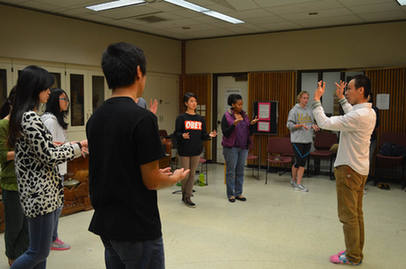Chinese Dramas Prosper in the U.S.
By CHEN QIANQIAN
As executive director of UCLA’s Confucius Institute, Dr. Susan Pertel Jain is proficient in Mandarin and has studied Chinese drama for many years. Through the Confucius Institute, she has devoted herself to researching and spreading Chinese culture.
The Confucius Institute at UCLA spreads Chinese culture through education and academic activities in Chinese language, drama, and cuisine, as well as traditional Chinese medicine.
|
 |
|
Students at the UCLA Confucius Institute learn to appreciate Chinese art through a drama performance class. |
Key to Understanding Chinese Dramas
Born in America, Susan studied French and Chinese as an undergraduate, and enjoyed music, dance and drama. After graduation, she went to Japan to learn Japanese, music and dance. When applying for postgraduate programs, she considered business or law. Later, she noticed a folk dance program at the University of Hawaii, researching performing arts from the aspect of culture. Eventually she pursued her master’s degree at the University of Hawaii, and was introduced to fascinating Asian dramas such as Japanese kabuki, Chinese opera, Indonesian dance and Indian kuttiyattam.
“These are the most interesting things I have ever seen, combining different elements and turning them into part of their countries’ culture. Sometimes performance arts are just for entertainment, but sometimes they are related to religious rites or politics.”
Thanks to her language advantages Susan won funding for a PhD in Chinese opera.
Susan believes that Asian drama is quite different from Western theater in many elements, including songs, music and distinctive movements. Chinese operas, in particular, often include martial arts. By contrast, Western dramas emphasize the use of language but not the application of body language.
In addition, she says, the storylines of Eastern and Western dramas differ distinctly. According to Susan, modern Western drama audiences usually do not know the plot of the story and are curious to know ending. However, many Asian dramas are analogous to early Western dramas, such as Shakespeare’s masterpieces. Audiences already know the storyline, and are interested in how performers play the classics.
Performance styles are also very different. Chinese operas have their own rules and are judged by their adherence to this standard. Performers train their voices and body language for many years. “Once you know these rules as well as how players use these specific ‘instruments’ to affect audiences, then you can appreciate the art. For example, the song played before a ball game in the U.S. is quite touching, and has a special symbolic significance,” said Susan, who holds that Asian dramas seek to integrate fixed art elements and recreate them for spectators. Then the audiences will acknowledge it, even though they already know these elements. “I think it is not impossible for Western audiences to enjoy Chinese dramas. The key lies in teaching them how to appreciate them,” Susan said.
